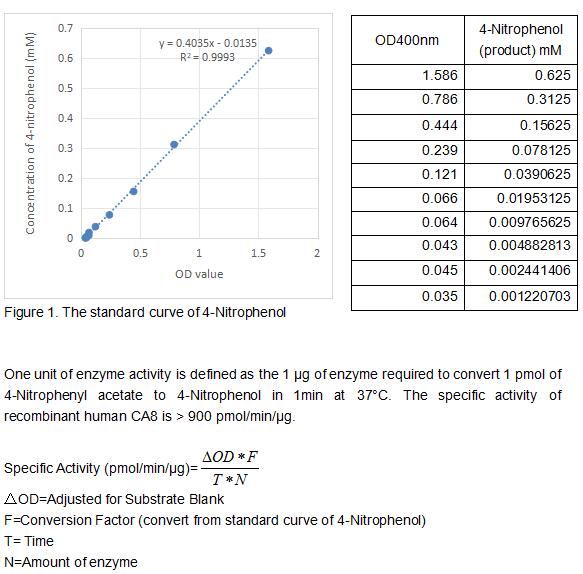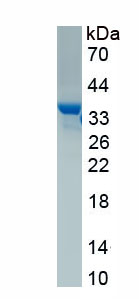Active Carbonic Anhydrase VIII (CA8) 

CAVIII; CA-VIII; CALS; CARP; Carbonic anhydrase-related protein
- UOM
- FOB US$ 274.00 US$ 686.00 US$ 1,372.00 US$ 4,116.00 US$ 10,290.00
- Quantity
Overview
Properties
- Product No.APD075Hu01
- Organism SpeciesHomo sapiens (Human) Same name, Different species.
- ApplicationsCell culture; Activity Assays.
Research use only - DownloadInstruction Manual
- CategoryEnzyme & Kinase
- Buffer FormulationPBS, pH7.4, containing 0.01% SKL, 5% Trehalose.
- Traits Freeze-dried powder, Purity > 95%
- Isoelectric Point4.8
Sign into your account
Share a new citation as an author
Upload your experimental result
Review

Contact us
Please fill in the blank.
Activity test

Carbonic Anhydrase (CA) catalyzes the reversible reaction of CO2 H2O = HCO3- H , which is fundamental to many processes such as respiration, renal tubular acidification and bone resorption. CA8, also called CA related protein (CARP), is a cytosolic protein without CA activity (i.e., the reversible hydration of CO2) due to point mutations in the zinc-binding site. CA8 is expressed exclusively in Purkinje cells of the cerebellum, where it binds inositol 1,4,5-triphosphate receptor type 1. CA8 overexpression in human colorectal cancer and non-small cell lung cancer indicates that it plays a role in the process of invasion in these types of malignancy. The activity of recombinant human CA8 was measured by its ability to hydrolyze 4-Nitrophenyl acetate (4-NPA) to 4-Nitrophenol. The reaction was performed in 12.5 mM Tris, 75 mM NaCl, pH 7.5 (assay buffer), initiated by addition 50 μL of various concentrations of CA8 (diluted by assay buffer) to 50 µL of 2 mM substrate 4-NPA (100 mM stock in Acetone, diluted by assay buffer). Incubated at 37℃ for 5min, then read at a wavelength of 400 nm.
Usage
Reconstitute in 10mM PBS (pH7.4) to a concentration of 0.1-1.0 mg/mL. Do not vortex.
Storage
Avoid repeated freeze/thaw cycles. Store at 2-8°C for one month. Aliquot and store at -80°C for 12 months.
Stability
The thermal stability is described by the loss rate. The loss rate was determined by accelerated thermal degradation test, that is, incubate the protein at 37°C for 48h, and no obvious degradation and precipitation were observed. The loss rate is less than 5% within the expiration date under appropriate storage condition.
Increment services
-
 BCA Protein Quantification Kit
BCA Protein Quantification Kit
-
 Molecular Mass Marker for Protein
Molecular Mass Marker for Protein
-
 Monoclonal Antibody Customized Service
Monoclonal Antibody Customized Service
-
 Polyclonal Antibody Customized Service
Polyclonal Antibody Customized Service
-
 Protein Activity Test Experiment Service
Protein Activity Test Experiment Service
-
 Electrophoretic Mobility Shift Assay (EMSA) Experiment Service
Electrophoretic Mobility Shift Assay (EMSA) Experiment Service
-
 Buffer
Buffer
-
 Lentivirus Packaging Experiment Service
Lentivirus Packaging Experiment Service
-
 Adenovirus Packaging Experiment Service
Adenovirus Packaging Experiment Service
-
 Real Time PCR Experimental Service
Real Time PCR Experimental Service
-
 Spike RBD Protein (S-RBD)
Spike RBD Protein (S-RBD)
-
 Protein G
Protein G
-
 Protein A
Protein A







